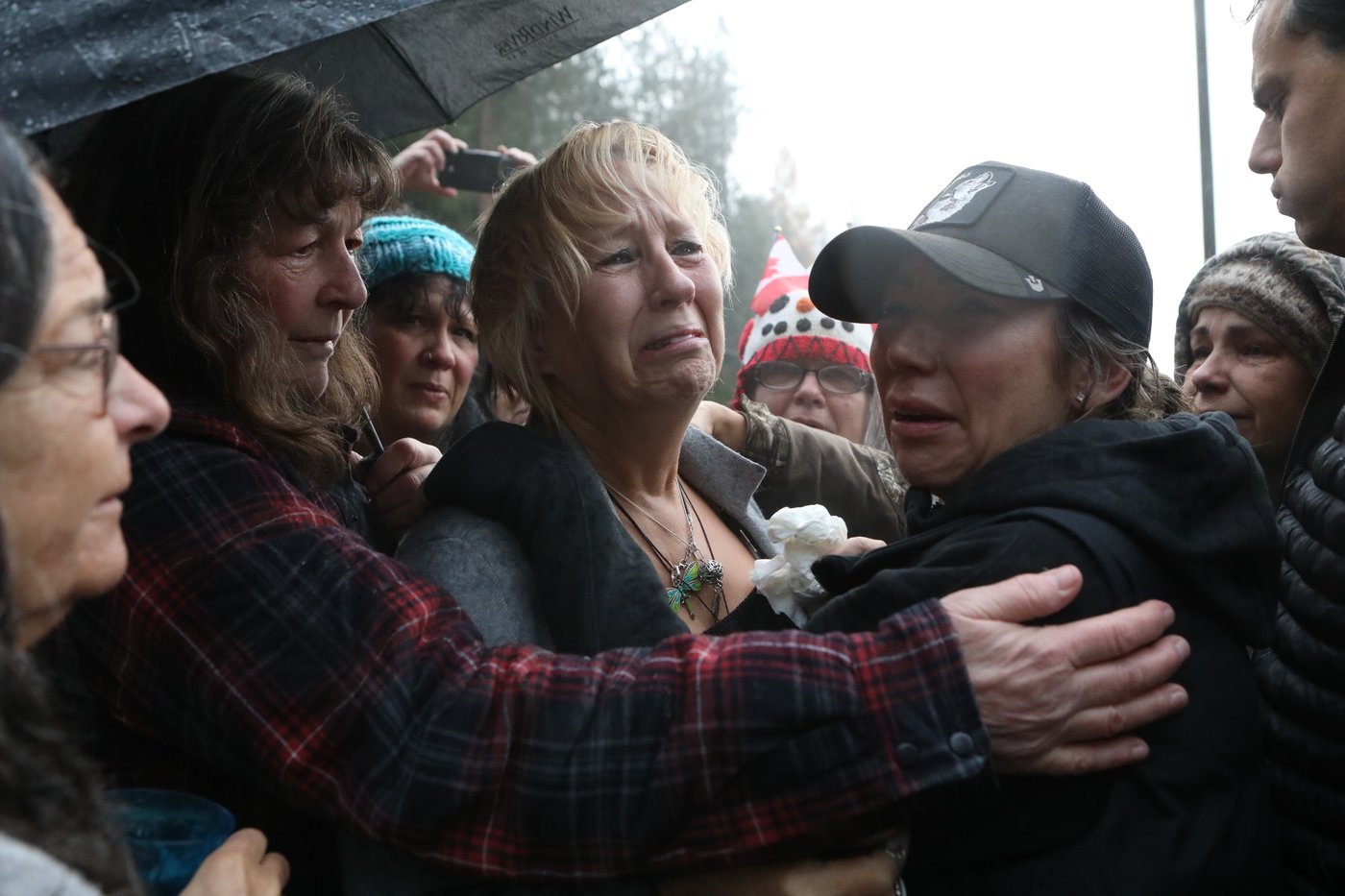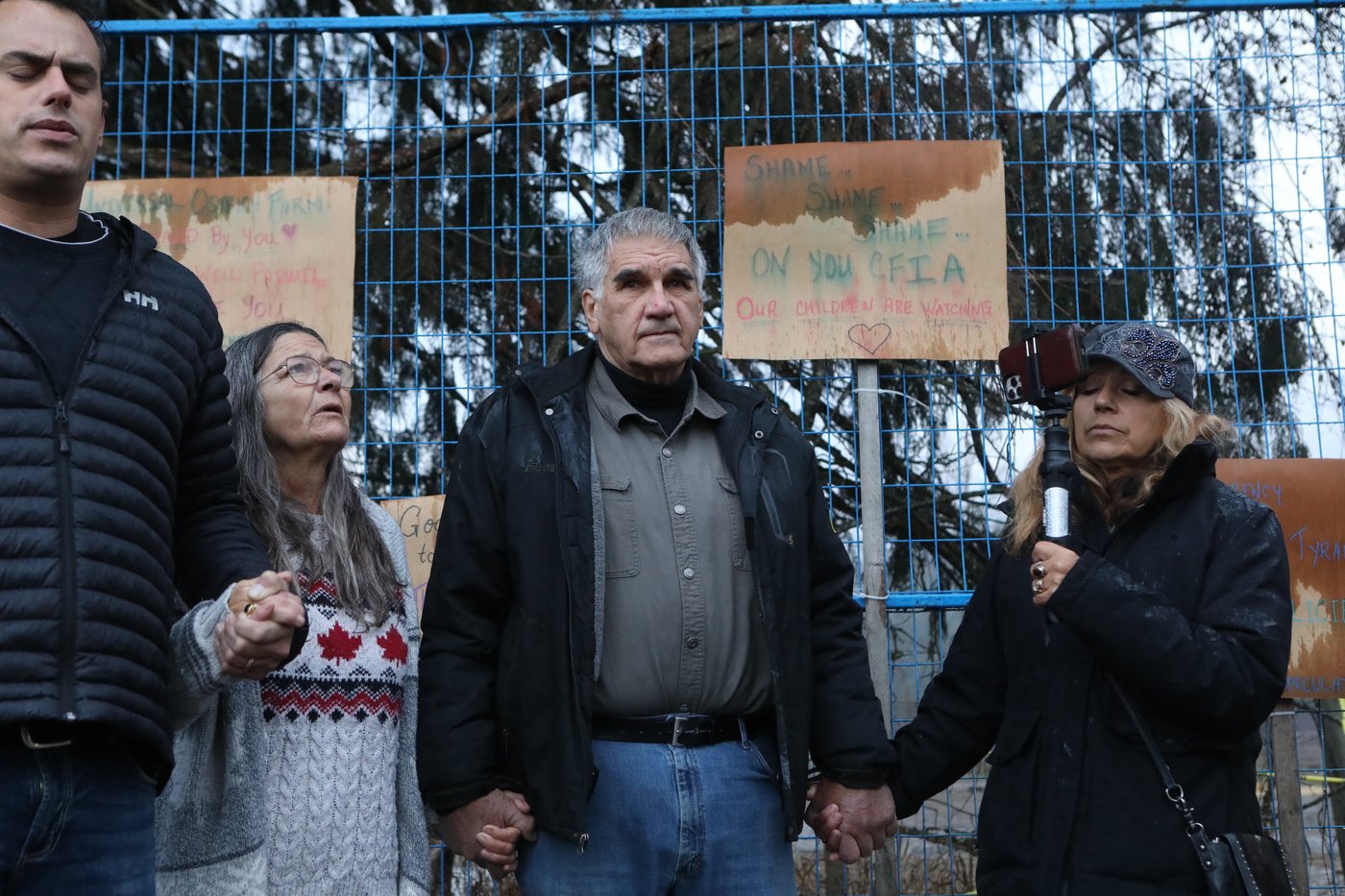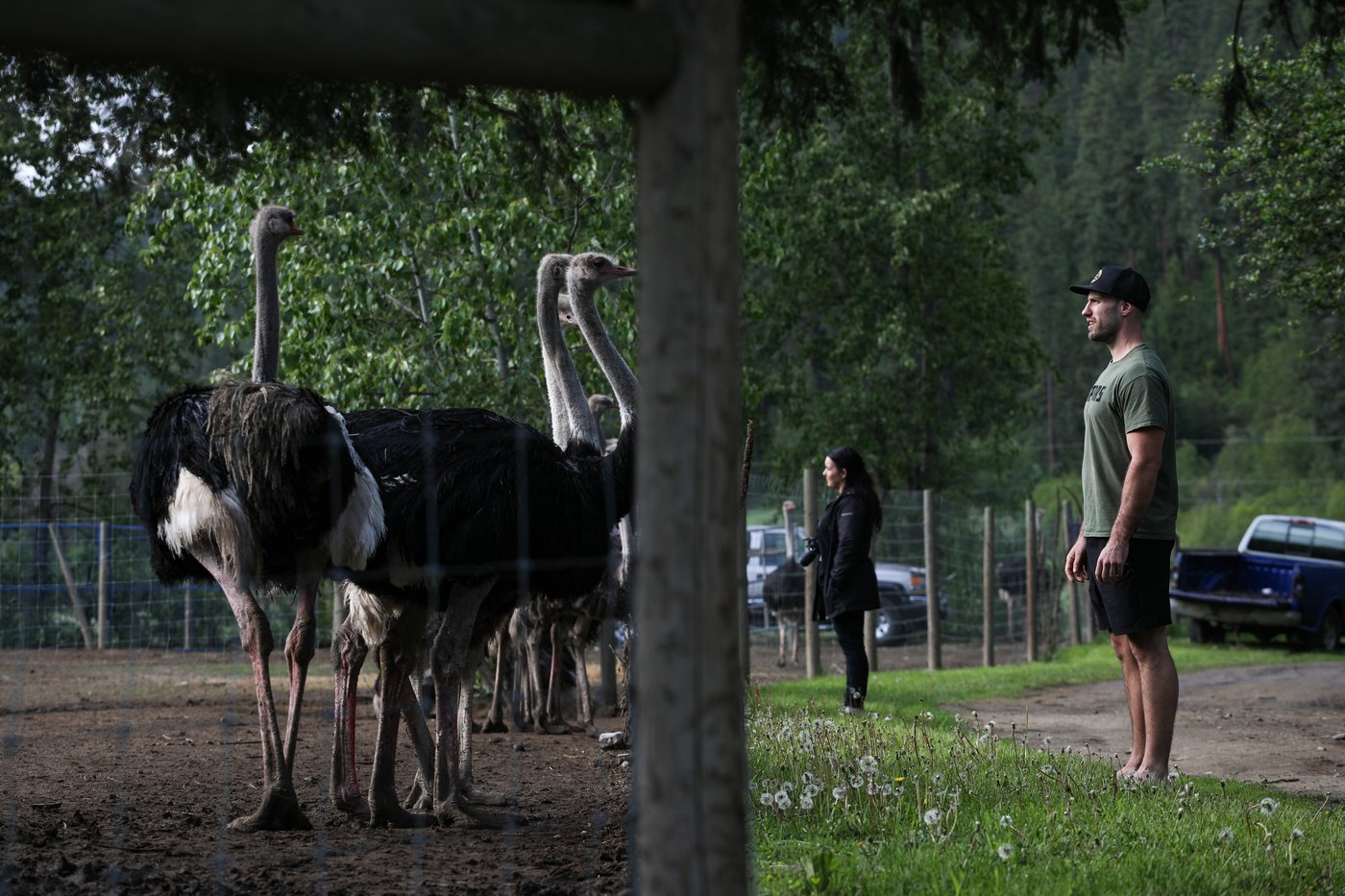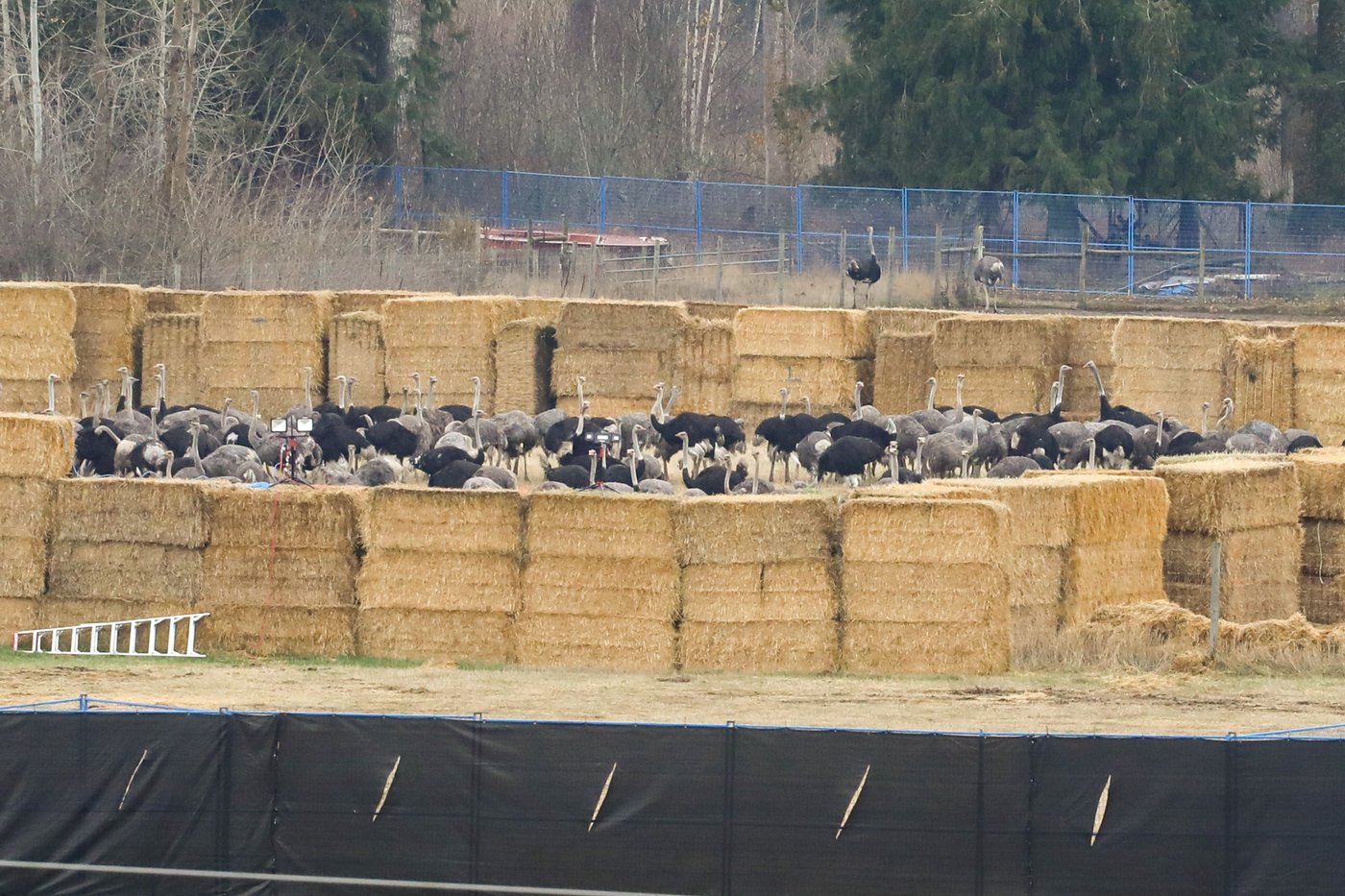Elevate your local knowledge
Sign up for the iNFOnews newsletter today!

EDGEWOOD, BRITISH COLUMBIA, CANADA — Numerous gunshots rang out in the night at a British Columbia ostrich farm, punctuated by shouts of “Murderers!” and “Stop!” as the Canadian Food Inspection Agency moved ahead with a cull of hundreds of the birds.
The shooting at Universal Ostrich Farms near Edgewood, B.C., on Thursday night was coming from inside an enclosure made of hay bales where the CFIA had herded scores of the ostriches.
A handful of the farm’s supporter were gathered at the side of the highway overlooking the enclosure, some crying, others yelling at the CFIA workers and RCMP during the gunfire, which began after darkness fell.
The operation came after the CFIA said it was moving ahead with the “complete depopulation and disposal” of the flock of hundreds of ostriches, more than 10 months after it ordered their destruction amid an avian flu outbreak.
The Supreme Court of Canada had announced earlier Thursday that it would not hear a final appeal against the cull by the farm’s owners, lifting any legal impediment to the killing of the flock that the CFIA said consisted of 300 to 330 birds.
The battle between the CFIA and the farm’s owners began when the agency ordered the cull on Dec. 31, 41 minutes after a lab test on a dead ostrich came back positive for avian flu in an outbreak that went on to kill about 70 of the birds.
Along the way it would draw attention from U.S. President Donald Trump’s administration, as well as domestic critics of what many of the farm’s supporters described as government overreach.
Supporters had gathered at the property ahead of Thursday’s decision, vehicles filing in before first light as rain streamed down.
A few dozen people formed a circle as co-owner Dave Bilinski delivered the news, which came at 6:45 a.m.
“Maybe a miracle will happen yet,” he said, as one protester called the CFIA “criminals” and said she would leave Canada.
The group then held a prayer asking for a “miracle Thursday.”
Later, it became clearer that no miracle was on the way.
In the afternoon, the highway overlooking the farm was lined with its supporters, some hugging and crying, as Canadian Food Inspection Agency workers in white biohazard suits rounded up the ostriches.
“CFIA you can stop!” yelled Katie Pasitney, whose mother, Karen Espersen, co-owns the farm in southeast B.C. “Run, pretty birds!”
Supporter Jeff Gaudry shouted to the workers through a loudspeaker: “You should be ashamed of yourself. You should go in there and let them cull you.”
The farmers had lost their case against the cull in Federal Court and the Federal Court of Appeal, but the operation was repeatedly delayed by court stays before Thursday’s blow from the Supreme Court.
A statement from the CFIA on Thursday said it had respected all orders of the courts “and expects the ostrich farm owners and supporters to do the same now that the Supreme Court of Canada has issued its judgment.”
The farm’s owners had argued the surviving birds showed no signs of illness and should be spared, saying they had acquired “herd immunity” and they were valuable for scientific value, while the inspection agency has said ostriches that appear healthy may still spread the disease.
Pasitney said the ostriches were all her family has loved for the last 35 years.
“I ask for the world to rise up, Canada to rise up, our farmers to rise up and make this a revolution,” she said early Thursday, while wiping away tears.
“This is our time to change history, and this is the time to protect your animals and protect your land rights, and protect yourself, you protect your children and you protect your grandchildren’s future because this isn’t the Canada that we want.”
Pasitney said she would make it her “life’s mission” to ensure the CFIA would no longer be able to operate in the same way.
She told reporters after hearing the decision that what came next would be traumatized animals.
“It’s murdering, murdering healthy animals that have been 35 years on this planet,” she said.
“They are prehistoric animals that have survived millions of years, but they won’t survive the Canadian Food Inspection Agency.”
Conservative MP Scott Anderson, whose riding covers the B.C. farm, told reporters in Ottawa that he was disappointed with the ruling.
“I think it goes to underscore the structural need for change within the CFIA.”
B.C. Agriculture and Food Minister Lana Popham called it a “very challenging situation,” while deferring to the CFIA.
“My heart goes out to all the farmers who are currently responding to outbreaks of avian influenza on their farms in British Columbia,” she said, referring to a recent spate of infections. “We respect the decision of the courts and the authority of the CFIA who lead the investigation and response to all avian influenza outbreaks.”
Opponents of the cull had waged their campaign on social media and elsewhere. They staged “Ostrichfest” concerts at the farm, where performers included convoy protest organizer Tamara Lich.
Bilinski told supporters on Thursday that the cull order was “totally ridiculous.”
“They won’t listen to the science. They know God damn well that those birds have the strongest antibodies out there right now and they’re destroying them. I’m afraid there’s — in my opinion — there’s no justice left.”
He said the CFIA didn’t test any of the surviving birds “because (officials) know they don’t have the virus, they’re loaded with antibodies.”
Animal Justice, a group that advocates for animal legal rights, issued an open letter to the CFIA on the eve of the ruling, saying it was “incumbent” on the agency to conduct new testing before taking the “irreversible step” of culling the birds.
The CFIA warned supporters of the farm that it was “an offence to obstruct or hinder an analyst, inspector or officer” performing duties under the Health of Animals Act and offenders could face up to two years in jail and a fine up to $250,000.
It said its “stamping-out policy,” which mandates complete culls of infected flocks, aims to protect both human and animal health, international trade access for Canada, and the $6.8-billion domestic poultry industry.
Shortly after the court’s announcement, CFIA workers had begun setting up equipment and lighting around the hay-bale enclosure. A flock of wild birds was seen in the ostrich pen, an occurrence that the CFIA has said poses avian flu infection risks.
Pasitney said before the cull that the farm owners were waiting to hear from their lawyer to see if there was anything more that could be done to save the birds.
“But I promise you, the Canadian Food Inspection Agency has just given us so much more, more fight for every farmer out there because under our watch we will never ever let another farmer go through this, and I know that the world isn’t going to either.”
— With files from Jim Bronskill in Ottawa.
This report by The Canadian Press was first published Nov. 6, 2025.





Want to share your thoughts, add context, or connect with others in your community?
You must be logged in to post a comment.
One response
It has been almost a year since the original outbreak, and they have not shown any signs of illness. Why do they have to kill so many healthy birds to just follow the guidelines? Wild birds serve as natural reservoirs for Avian flu anyway, so all these ostriches contained in the farm should not pose any immediate threat. They could be used for further research to combat the Avian flu if they have acquired the herd immunity. CFIA is making a big mistake.